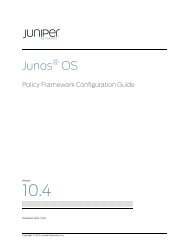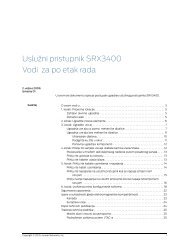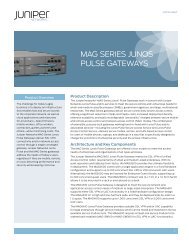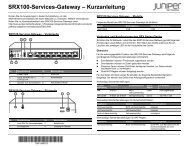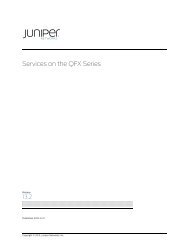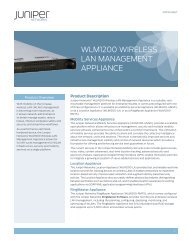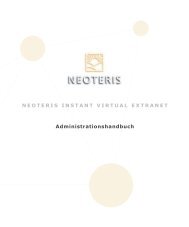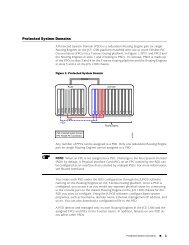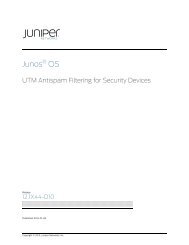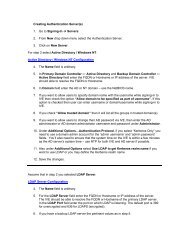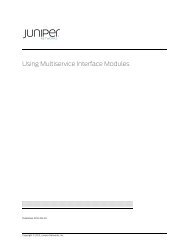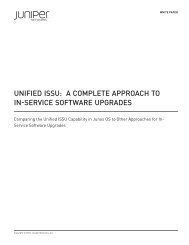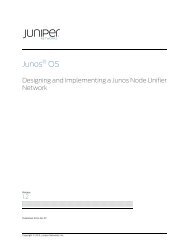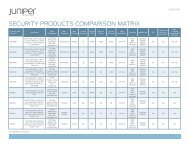ISSU: A Planned Upgrade Tool - Juniper Networks
ISSU: A Planned Upgrade Tool - Juniper Networks
ISSU: A Planned Upgrade Tool - Juniper Networks
You also want an ePaper? Increase the reach of your titles
YUMPU automatically turns print PDFs into web optimized ePapers that Google loves.
WHITE PAPER - <strong>ISSU</strong>: A <strong>Planned</strong> <strong>Upgrade</strong> <strong>Tool</strong><br />
<strong>Juniper</strong> <strong>Networks</strong> Unified <strong>ISSU</strong><br />
The <strong>Juniper</strong> <strong>Networks</strong> solution for upgrades is known as unified <strong>ISSU</strong>. Unified <strong>ISSU</strong> markedly reduces the time and<br />
risk factors commonly associated with software upgrades. Of particular significance are the extensive regression<br />
tests that each release undergoes for its <strong>ISSU</strong> availability, which is only part of <strong>Juniper</strong> <strong>Networks</strong> longstanding<br />
quality control procedures.<br />
On supported, dual Routing Engine platforms, unified <strong>ISSU</strong> enables a complete upgrade from one version of Junos<br />
OS to another without control plane disruption and with minimal disruption of traffic. For example, customers can<br />
use unified <strong>ISSU</strong> today to migrate their <strong>Juniper</strong> <strong>Networks</strong> platforms from one Junos OS release to another.<br />
Design Goals<br />
Changes made to the Junos OS to support <strong>ISSU</strong> reflect the fundamental engineering principles of <strong>Juniper</strong> <strong>Networks</strong>.<br />
These design goals are an integral part of <strong>Juniper</strong>’s overall objective to provide continuous systems that protect<br />
network uptime and ensure high availability.<br />
• Mitigate overall risks. An overly complex implementation or a design that requires an exponential verification<br />
process to eliminate risks may be more problematic than the traditional method of taking equipment offline<br />
during an upgrade.<br />
• Eliminate protocol flapping. Unified <strong>ISSU</strong> does not impact protocol adjacencies or routing on any of the <strong>Juniper</strong><br />
<strong>Networks</strong> platforms.<br />
• Eliminate dependency on other nodes in the network. Unified <strong>ISSU</strong> relies on nonstop active routing, which<br />
prevents protocol adjacency flapping during an upgrade with no requirement for neighbor support.<br />
• Support all hardware types. The unified <strong>ISSU</strong> design supports both fully redundant and partially redundant<br />
upgrade paths without compromising essential engineering principles.<br />
• Remove or minimize the planned software upgrade’s affect on SLAs. Unified <strong>ISSU</strong> keeps protocol adjacencies<br />
intact with minimal packet drops on transit traffic.<br />
Software Development Process<br />
Junos OS is a single operating system with a single source code base and single implementation of control plane<br />
features. <strong>Juniper</strong> <strong>Networks</strong> developers and engineers follow a set of development principles to maintain this single<br />
train model:<br />
• New features are available only in new releases.<br />
• Maintenance (working) releases are for updates to existing features.<br />
• <strong>Juniper</strong> <strong>Networks</strong> does not back-port features to previously released versions.<br />
• Features requested by customers are developed and released in the main line code.<br />
Following these rules means that at all times developers are working with only a single source of code for each<br />
release. The result is well understood code with new features and changes that carefully tested for worry-free<br />
integration. This single train model is also an advantage in regression testing, which focuses only on the new<br />
features rather than the entire train or branches and patches of code.<br />
Regression Testing<br />
The <strong>Juniper</strong> <strong>Networks</strong> approach to <strong>ISSU</strong> ensures that users are running fully supported, fully tested software code.<br />
The Junos OS testing process includes repeated testing with automated regression scripts, ensuring previously<br />
delivered features continue to work as expected in each new release. Developed over many years, these test scripts<br />
are critical intellectual property of <strong>Juniper</strong> <strong>Networks</strong>. Through extensive testing of each Junos OS release, bugs and<br />
other problems are more likely to be found and corrected before customers see the new version.<br />
<strong>ISSU</strong> regression testing is most reliable when it is only necessary to qualify new features, not multiple versions or<br />
feature packages. The Junos OS advantage in this context is its single software release train, which delivers new<br />
versions as a superset of features, each passing thorough regression testing with no critical errors.<br />
6 Copyright © 2010, <strong>Juniper</strong> <strong>Networks</strong>, Inc.



